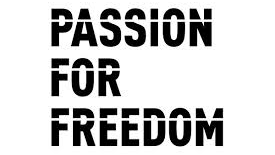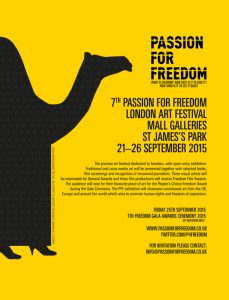LONDON, UNITED KINGDOM
Mall Galleries
21.09 – 26.09 2015
CATEGORIES: ART, FILMS, BOOKS
7th PFF Festival and Gala Night
7th Passion for Freedom Gala Night was a tremendous success, with hundreds queuing outside Mall Galleries on a red carpet waiting impatiently to get in, the show could not go any better.The Gallery was saturated with awaiting and exasperation of visitors commenting the artwork, chatting away, discussing limits of freedom in art, yet waiting impatiently to learn who would become the Freedom Ambassador of 2015.
That evening they were soon to learn that 2015 PFF 1st Award and People’s Choice Award was granted to Emma Elliot for The Spin-Head and The Sacred and Profane respectively. You can learn more on the awarded 2015 PFF artworks from our blog post.
Are there limits to freedom in the UK?
Tragic events, which took place in France and Denmark at the beginning of 2015, showed there are clearly more reasons than ever to highlight the importance of freedom of speech. The year 2015, in which 17 journalists and bloggers were killed, many more were sent to jail and the world heritage in Palmyra and Nineveh have been destroyed, became a litmus paper for freedom of expression in the Western world. Very soon the PFF organizer were to learn that their freedom in choosing and showing art would become seriously limited.
The controversy and blatant censorship imposed on one of the artworks and reluctance of the organizers to succumb to the outrageous conditions imposed by the gallery on them, proved that there are actually limits to the freedom in arts in the UK.
2015 EXHIBITION
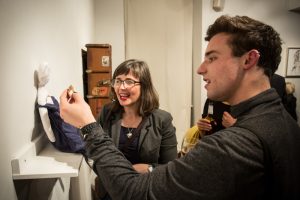
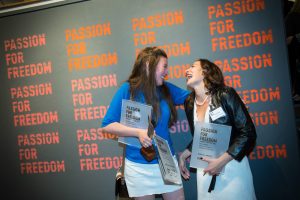
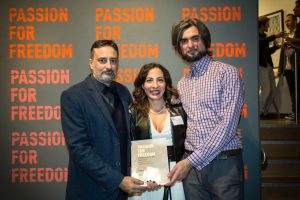
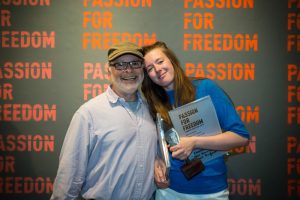

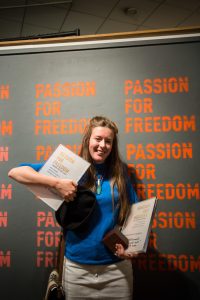


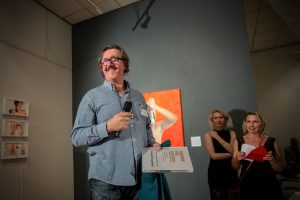
CATEGORY: ART
AWARDS:
1st Prize Freedom Ambassador – Emma Elliott for Spin – Head
2nd Prize – Dmitry IV for The Need for Freedom
2nd Prize – Ana Muscet for A Change of Air
3rd Prize – Glenn Fitzpatrick for Contextual Restriction Produces an Empty Magazine
People’s Choice – Emma Elliott for The Sacred and Profane
Freedom Hero Award – Charlie Hebdo

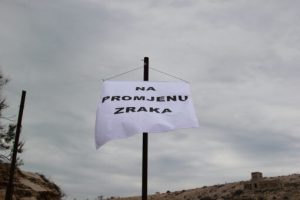
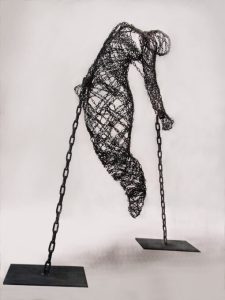
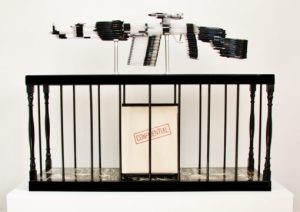

CATEGORY: FILM
This year’s nominated films are thoughtfully chosen and represent stories from 24 countries world-wide. The spectrum of freedom is vast and shows the range of topics from censorship, blasphemy, dictatorship through girls and female situation in various countries, education, sexual harassment, to the most up-to-date events such as the rise of ISIS and assaults on freedom of expression generally, and freedom of speech particularly, in Western societies.
That is why this year’s film selection panel could not avoid but highlight the events which took place in France and Denmark. By nominating Cartoonists – Footsoldiers of Democracy, PFF bows down to all cartoonists using the international language of image to provoke discussion and check the status of freedom. By acknowledging their vital and catharsis-bringing role in every healthy society, Passion for Freedom can’t help but agree with the theme statement of the document: “Cartoon is a visual metaphor; it is not just news, it is warning”.
Passion for Freedom joins that warning and promises to remain a litmus paper of the condition of freedom in our western societies.
AWARDS:
1st Prize – Cartoonists: Foot-soldiers of Democracy? by Stéphanie Valloatto (France)
12 lovable lunatics, capturing the comic and tragic in all four corners of the earth: cartoonists who risk their lives to defend democracy, with a smile on their faces and a pencil as their only weapon.
2nd Prize – Shield and Spear by Peter Ringbom (South Africa)
An artist paints a caricature of South African president Jacob Zuma that provokes a lawsuit, death threats and a massive street protest. Around this incident, Shield and Spear explores a constellation of stories about identity, art, race, and freedom of expression in South Africa, twenty years into democracy.
3rd Prize – Stronger Than Arms by Babylon’13 (Ukraine)
HIGH TECH, LOW LIFE follows the journey of two of China’s first citizen reporters as
they travel the country chronicling underreported news and social issues stories. Armed
with laptops, cell phones, and digital cameras they develop skills as independent one-man
news stations while learning to navigate China’s evolving censorship regulations and avoiding
the risk of political persecution. The film follows 57-year-old “Tiger Temple,” who earns the
title of China’s first citizen reporter after he impulsively documents an unfolding murder and
27-year-old “Zola” who recognizes the opportunity to increase his fame and future prospects by reporting on sensitive news throughout China.
Honoured mentioned movie – Parvati Saves The World by Ram Devineni (USA)
Special award – Gamze Seber for video performance Breath
CATEGORY: BOOK
“What is the difference between men and women? In Afghanistan, it’s freedom”, Jenny Nordberg, author.
In the Freedom Books Section, PFF recognises the work of courageous and inquisitive authors and journalists, who show the way the world order is established. By blatantly disagreeing with it and giving the examples of brave people (women especially), be it in Afghanistan, Russia, India or Turkey, the authors make a firm stance on freedom of expression and freedom to be a woman.
Their characters by not knowing their rights, living in cultures where women are less worth than men or simply by speaking up, trying to find ways to survive (The Underground Girls of Kabul), challenge establishment (Words Will Break Cement), learn that rape is a crime which is not committed by them (Priya Shakti), or that their rights should be equal to that of men’s (Uprising).
NOMINATES:
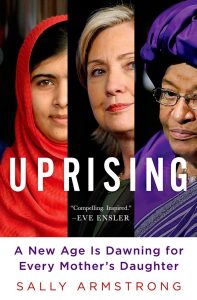
1. Uprising: A New Age Is Dawning for Every Mother’s Daughter, Sally Armstrong
From mud-brick houses in Afghanistan to the forests of Congo, where women still hide from their attackers, to a shelter in northern Kenya, where 160 girls between 3 and 17 have won an historic court case against a government who did not protect them from rape, to Pakistan, where Malala Yousafzai is fighting for the rights of women everywhere, Uprising is about the final frontier for women: having control over your own body, whether in zones of conflict, in rural villages, on university campuses or in your own kitchen.
Human rights activist and journalist Sally Armstrong has covered stories about women and girls in the zones of conflict all over the world. Her eye witness reports have earned her awards including the Gold Award from the National Magazine Awards Foundation. She received the Amnesty International Media Award in 2000, 2002 and 2011, and she was a member of the International Women’s Commission, a UN body whose mandate is assisting with the path to peace in the Middle East.
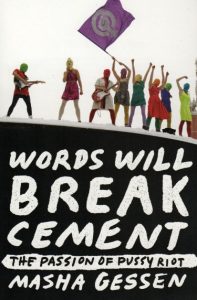
2. Words Will Break Cement: The Passion of Pussy Riot, Masha Gessen
In 2012, Pussy Riot staged a performance in Moscow’s Cathedral. Dressed in their trademark, brightly coloured dresses and balaclavas, the women performed the song ‘Punk Prayer – Mother of God, Chase Putin Away!’ in front of the altar. The performance lasted only 40 seconds but it resulted in two-year prison sentences for three of the performers – and has turned Pussy Riot into one of the most well-known and important protest movements of the last five years. This necessary and timely book is an account of the Pussy Riot protest, the ensuing global support movement, and the tangled and controversial trial of the band members. It explores the status of dissents in Russia, the roots of the group and their adoption – or appropriation – by wider collectives, feminist groups and music icons.
Masha Gessen is a Russian and American journalist, author, and activist noted for her opposition to Russian President Vladimir Putin. Gessen identifies as a lesbian and has written extensively on LGBT rights and help founded the Pink Triangle Campaign. She has said about herself that for many years she was “probably the only publicly out gay person in the whole country.”
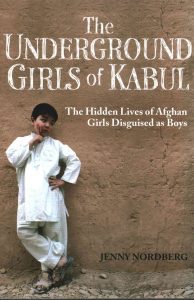
3. The Underground Girls of Kabul: The Hidden Lives of Afghan Girls Disguised as Boys, Jenny Nordberg
In Afghanistan, where society is ruled almost entirely by men, the birth of a son is cause for celebration and the arrival of a daughter is often mourned as a failure. The author follows Afghan girls who live disguised as boys through childhood and puberty, only to be expected by adult age to transform into subordinate wives and mothers. The book is anchored by vivid female characters who bring this ancient phenomenon to life: Azita, a female parliamentarian whose youngest daughter is chosen to pose as her only son; Zahra, the tomboy teenager who struggles with puberty and resists her parents’ attempts to turn her into a woman; Shukria, who was forced to marry and have three children after living for twenty years as a man; and Shahed, an Afghan special forces soldier, still in disguise as an adult man.
Jenny Nordberg is an investigative reporter, correspondent and author. She is based in New York, Stockholm and Kabul.
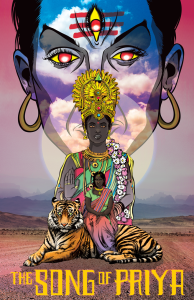
4. Priya’s Shakti, Ram Devineni
Priya’s Shakti is India’s first augmented reality comic book that tells the story of Priya, a villager from India who is gang raped by men in her village. When she recalls her ordeal to her family, they shun her saying she has brought shame on them. Ashamed and scared Priya flees to the forest to end her life. But the Goddess Parvati sees her plight and seeks to help her. A rape survivor and the Goddess Parvati fight against gender-based sexual violence and champion the cause of women’s rights. The graphic novel’s physical copies are now being distributed to rural schools in India as a pilot project, to see if such books can create awareness among children and the youth, about the evil of rape so that men can be sensitized towards rapes and how rape victims are treated. By scanning the comic book with the popular augmented reality app – Blippar, you can view animation, real-life stories, and other interactive elements pop-out of the pages.
A filmmaker, publisher and founder of Rattapallax films, press and magazine based in New York City, Sao Paulo and New Delhi.
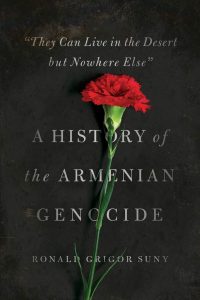
5. They Can Live in the Desert but Nowhere Else: A History of the Armenian Genocide, Ronald Grigor Suny
As it lost territory during the war, the Ottoman Empire was becoming a more homogenous Turkic-Muslim state, but it still contained large non-Muslim communities, including the Christian Armenians. The Young Turk leaders of the empire believed that the Armenians were internal enemies secretly allied to Russia and plotting to win an independent state. But the great majority of Armenians were in truth loyal subjects who wanted to remain in the empire. Starting in early 1915, the Ottoman Turks began deporting and killing hundreds of thousands of Armenians in the first major genocide of the twentieth century. By the end of the First World War, the number of Armenians in what would become Turkey had been reduced by ninety per cent – more than a million people. In this definitive narrative history, Ronald Suny cuts through nationalist myths, propaganda, and denial to provide an unmatched account of when, how, and why the atrocities of 1915–16 were committed.
Ronald Grigor Suny is director of the Eisenberg Institute for Historical Studies, the Charles Tilly Collegiate Professor of Social and Political History at the University of Michigan, and Emeritus Professor of political science and history at the University of Chicago. He was the first holder of the Alex Manoogian Chair in Modern Armenian History at the University of Michigan.
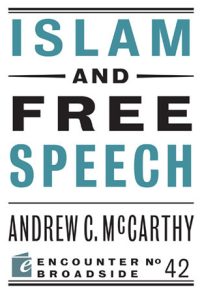
5. Islam and Free Speech, Andrew C. McCarthy
As it lost territory during the war, the Ottoman Empire was becoming a more homogenous Turkic-Muslim state, but it still contained large non-Muslim communities, including the Christian Armenians. The Young Turk leaders of the empire believed that the Armenians were internal enemies secretly allied to Russia and plotting to win an independent state. But the great majority of Armenians were in truth loyal subjects who wanted to remain in the empire. Starting in early 1915, the Ottoman Turks began deporting and killing hundreds of thousands of Armenians in the first major genocide of the twentieth century. By the end of the First World War, the number of Armenians in what would become Turkey had been reduced by ninety per cent – more than a million people. In this definitive narrative history, Ronald Suny cuts through nationalist myths, propaganda, and denial to provide an unmatched account of when, how, and why the atrocities of 1915–16 were committed.
Ronald Grigor Suny is director of the Eisenberg Institute for Historical Studies, the Charles Tilly Collegiate Professor of Social and Political History at the University of Michigan, and Emeritus Professor of political science and history at the University of Chicago. He was the first holder of the Alex Manoogian Chair in Modern Armenian History at the University of Michigan.
